AWM41 1045 - [Nurses Narratives] N F S Smith - Part 2
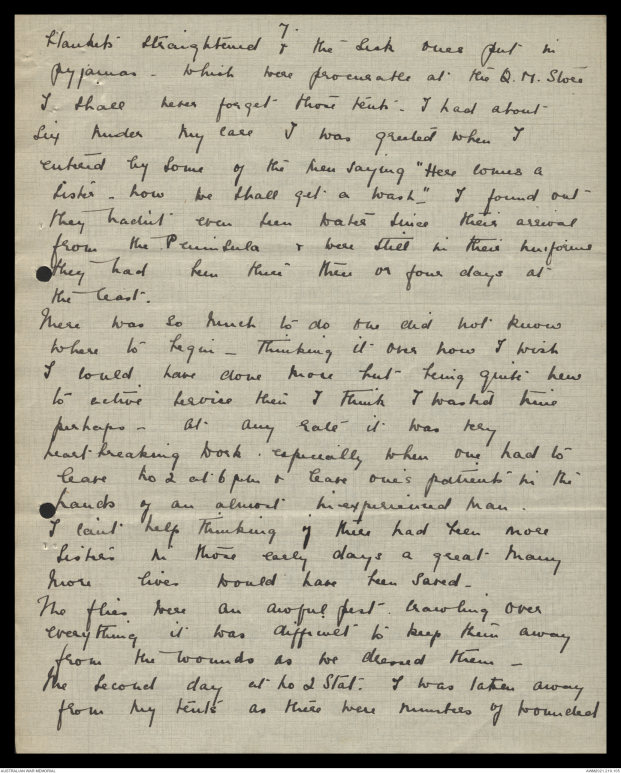
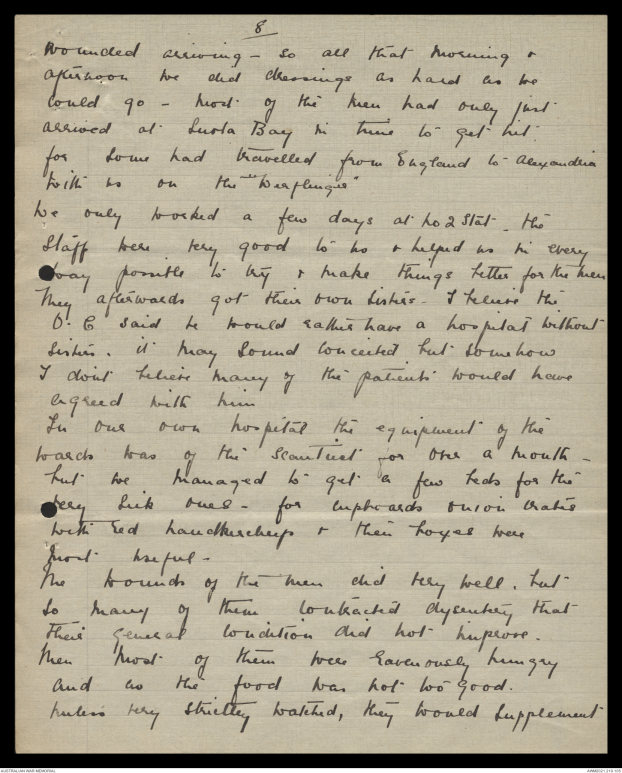
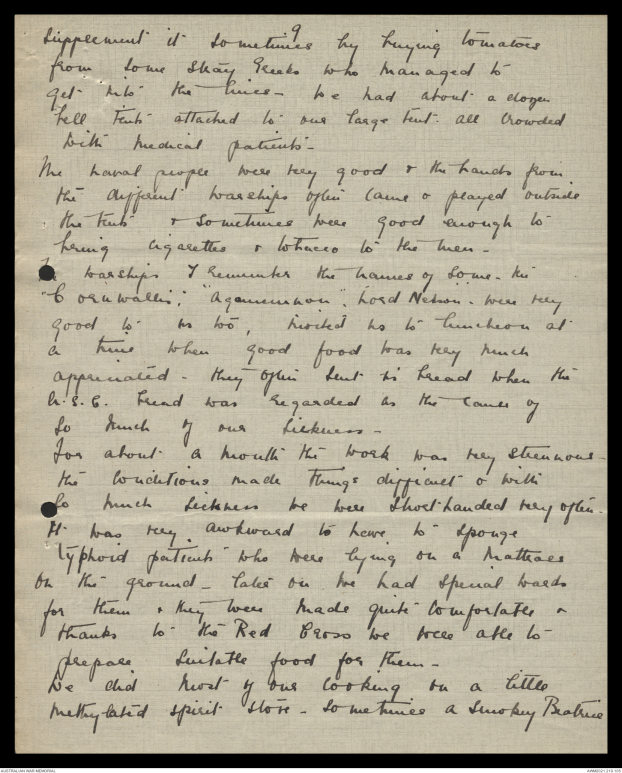
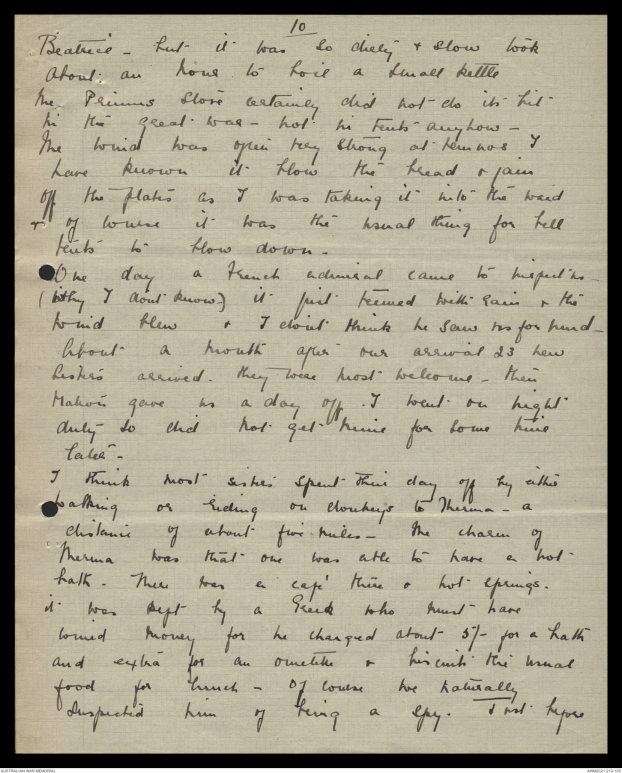
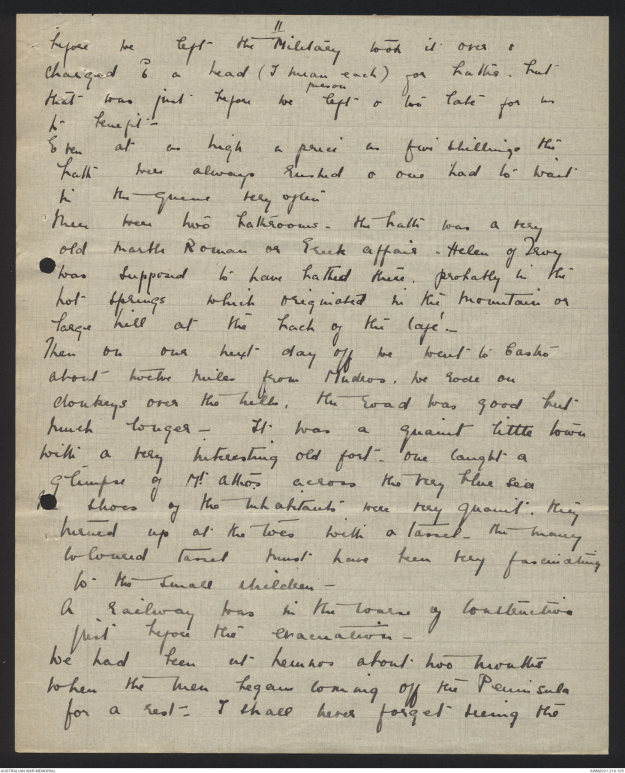
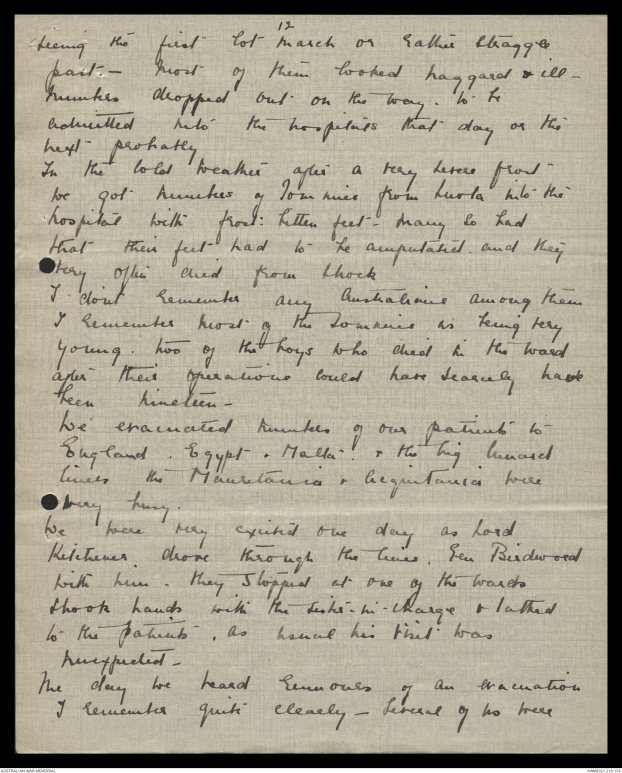
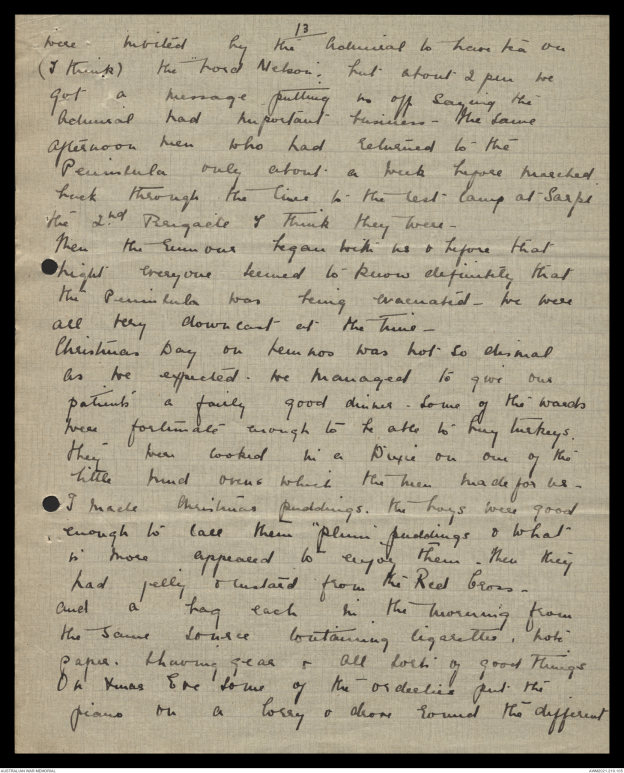
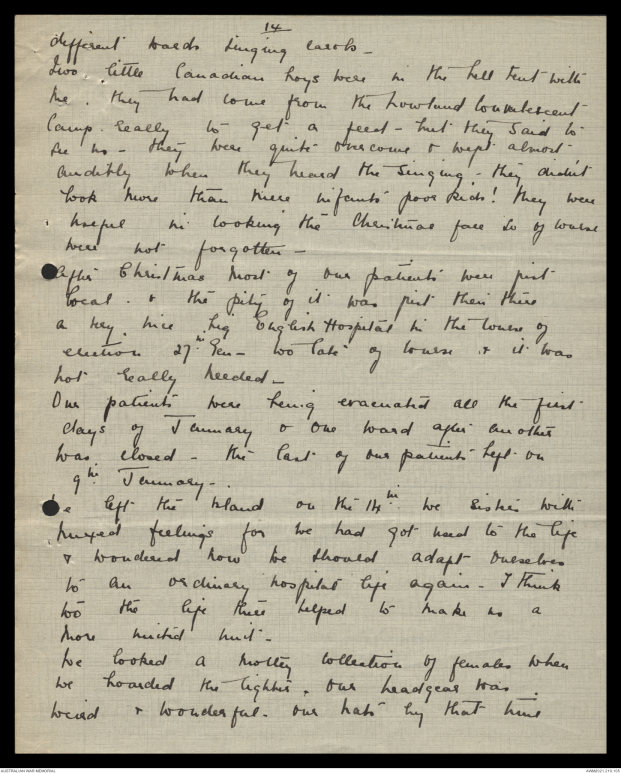
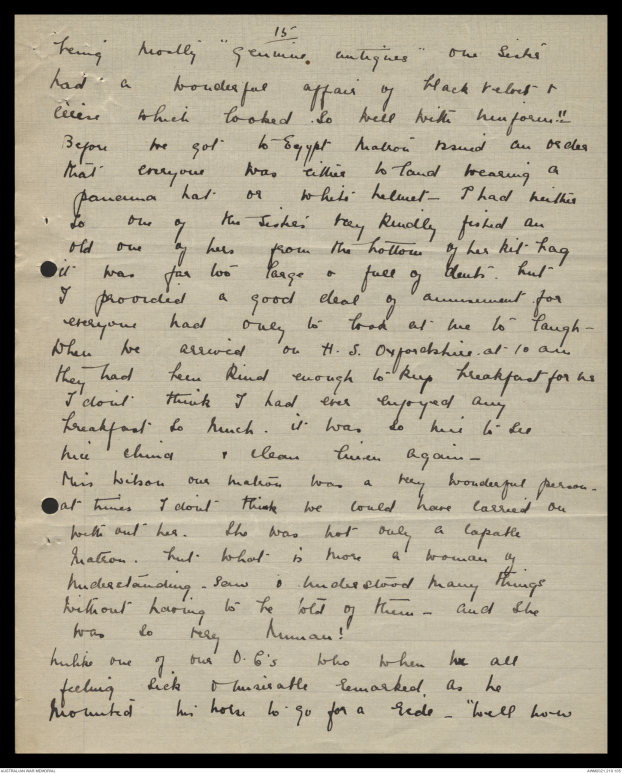
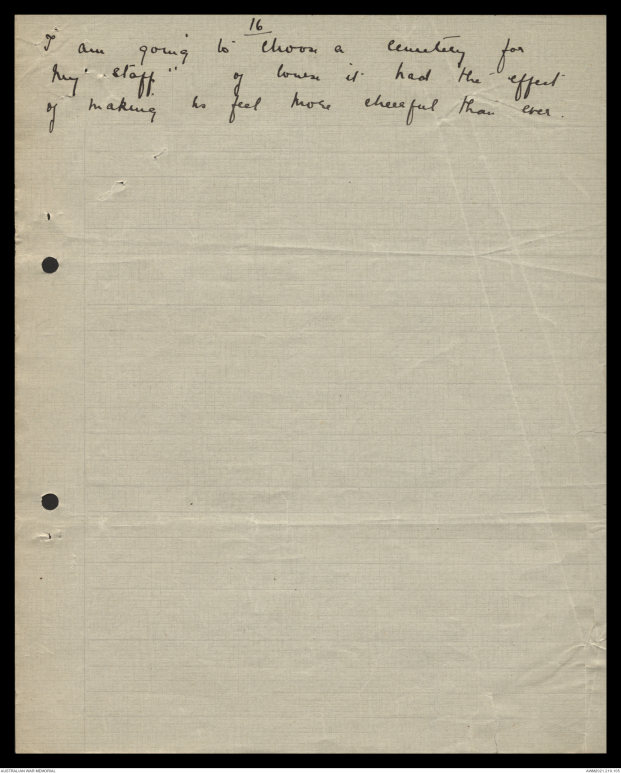
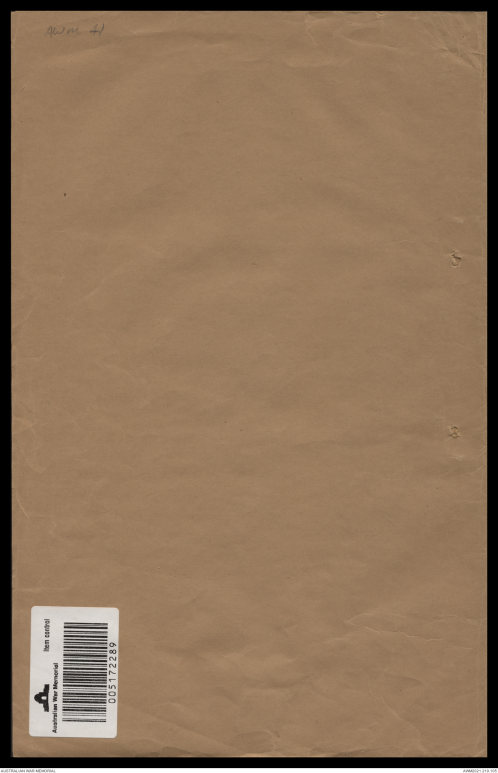
7.
Blankets Straightened of the sick ones put in
pyjamas - which were procurable at the Q.M. Store
I shall never forget those tents. I had about
six under my care I was greeted when I
entered by some of the men saying "Here comes a
Sister- now we shall get a wash-" I found out
they hadn't even seen water since their arrival
from the Peninsula & were still in their uniforms
They had been there three or four days at
the least.
There was so much to do one did not know
where to begin - thinking it over how I wish
I could have done more but being quite new
to active service then I think I wasted time
perhaps - At any rate it was very
heart breaking work especially when one had to
leave No 2 at 6pm & leave one's patients in the
hands of an almost inexperienced man.
I can't help thinking if there had been more
Sisters in those early days a great many
more lives would have been saved.
The flies were an awful pest crawling over
everything it was difficult to keep them away
from the wounds as we dressed them-
The second day at No 2 Stat. I was taken away
from my tents as there were numbers of wounded
8
wounded arriving - so all that morning &
afternoon we did dressings as hard as we
could go - most of the men had only just
arrived at Lurta Bay in time to get hit
for some had travelled from England to Alexandria
with is on the "Werflingie"
We only worked a few days at No 2 Stat - the
Staff were very good to us & helped as in every
way possible to try & make things better for the men
They afterwards got their own Sisters. I believe the
O.C. said he would rather have a hospital without
Sisters. it may sound conceited but somehow
I don't believe many of the patients would have
agreed with him
In our own hospital the equipment of the
wards was of the scantiest for over a month -
but we managed to get a few beds for the
very sick ones - for cupboards onion crates
with red handkerchiefs & their boxes were
most useful.
The wounds of the men did very well, but
so many of them contracted dysentry that
their general condition did not improve.
Then most of them were ravenously hungry
and as the food was not too good.
unless very strickly watched, they would supplement
9
supplement it sometimes by buying tomatoes
from some stray Greeks who managed to
get into the lines- We had about a dozen
bell tents attached to our large tent all crowded
with medical patients.
The naval people well very good & the bands from
the different warships often came & played outside
the tents & sometimes were good enough to
bring cigarettes & tobacco to the men -
The warships I remember the names of some -the
"Cornwallis" ; "Agamemnon", "Lord Nelson". were very
good to us too, invited us to luncheon at
a time when good food was very much
appreciated. they often sent us bread when the
G.S.C. bread was regarded as the cause of
so much of our sickness -
For about a month the work was very strenuous -
the conditions made things difficult & with
so much sickness we were short handed very often.
It was very awkward to have to sponge
typhoid patients who were lying on a mattress
on the ground - later on we had special wards
for them & they were made quite comfortable -
thanks to the Red Cross we were able to
prepare suitable food for them.
We did most of our cooking on a little
methylated spirit stove - sometimes a Smokey Beatrice
10
Beatrice – but it was so dicky & slow took
about an hour to boil a small kettle
The Primus stove certainly did not do its bit
in the great war – not in tents anyhow-
The wind was often vey strong at Lemnos I
have known it blow the bread & jam
off the plates as I was taking it into the ward
& of course it was the usual thing for bell
tents to blow down.
One day a French admiral came to inspect us
(why I dont know) it just teemed with rain & the
wind blew & I dont think he saw us for mud -
About a month after our arrival 23 new
Sisters arrived. they well most welcome - their
Matron gave us a day off. I went on night
duty so did not get mine for some time
later -
I think most sisters spent their day off by either
walking or riding on donkeys to Therma- a
distance of about five miles - the charm of
Therma was that one was able to have a hot
bath. There was a café there & hot springs.
it was kept by a Greek who must have
loved money for he charged about 5/- for a bath
and extra for an omelette & biscuits the usual
food for lunch – of course we naturally
suspected him of being a spy. Just before
11
before we left the Military took it over &
charged 6d. a head (I mean each person) for baths. but
that was just before we left & too late for us
to benefit.-
Even at as high a price as five shillings the
bath was always rushed & one had to wait
in the queue very often"
There were two bathrooms. the bath was a very
old marble Roman or Greek affair. Helen of Troy
was supposed to have bathed there. probably in the
hot springs which originated in the mountain or
large hill at the back of the Cafe-
Then on our next day off he went to Castro -
about twelve miles from Mudros. We rode on
donkeys over the hills, the road was good but
much longer- It was a quaint little town
with a very interesting old fort - one caught a
Glimpse of Mt Athos across the very blue sea
The shoes of the inhabitants were very quaint. they
turned up at the toes with a tassel - the many
coloured tassel must have been very fascinating
to the small children -
A railway was in the course of Construction
just before the evacuation -
We had been at Lemos about two months
when the men began coming off the Pennisula
for a rest- I shall never forget seeing the
12
seeing the first lot march or rather straggle
past - most of them looked haggard & ill -
numbers dropped out on the way. to be
admitted into the hospitals that day or the
next probably
In the cold weather after a very severe frost
we got numbers of Tommies from Luola into the
hospital with frost bitten feet - many so bad
that their feet had to be amputated and they
very other died from shock
I don't remember any Australians among them
I remember most of the Tommies as being very
young. two of the boys who died in the ward
after their operations could have scarcely have
been nineteen -
We evacuated numbers of our patients to
England. Egypt . Malta & the big Cunard
liners the Mauritania & Aequitania were
very busy.
We were very excited one day as Lord
Kitchener, drove through the lines. Gen Birdwood
with him. they stopped at one of the wards
shook hands with the Sister-in- charge & talked
to the patients, as usual his visit was
unexpected -
The day be heard rumours of an evacuation
I remember quite clearly – Several of us were
13
were invited by the Admiral to have tea on
(I think) the Lord Nelson: but about 2 pm we
got a message putting us off saying the
Admiral had important business - the same
afternoon men who had returned to the
Peninsula only about a week before marched
back through the line to the tent Camp at Sarpe
the 2nd Brigade I think they were-
Then the rumour began with us & before that
night everyone seemed to know definitely that
the Peninsula was being evacuated - we were
all very downcast at the time --
Christmas Day on Lemnos was not so dismal
as we expected. We managed to give our
patients a fairly good dinner - Some of the wards
were fortunate enough to be able to buy turkeys
they were cooked in a Dixie on one of the
little mud ovens which the men made for us -
I made Christmas puddings. the boys were good
enough to call them "plum" puddings & what
is more appeared to enjoy them. Then they
had jelly & custard from the Red Cross.
And a bag each in the morning from
the same source containing cigarettes, note
paper. shaving gear & all sorts of good things
On Xmas Eve some of the orderlies put the
piano on a lorry & drove round the different
14
different wards singing carols -
Two little Canadian boys were in the hill tent with
me. they had come from the Lowand Convalescent
Camp. really to get a feed - but they said to
see us - they were quite overcome & wept almost
audibly when they heard the singing - they didn't
look more than mere infants' poor kids! They were
useful in cooking the Christmas fare so of course
were not forgotten-
After Christmas most our patients were just
local. & the pity of it was just then there
a very nice big English Hospital in the town of
election 27th Gen - too late of course & it was
not really needed -
On patients were being evacuated all the first
days of January & one ward after another
was closed - the last of our patients left on
9th January -.
We left the Island on the 14th We Sisters with
mixed feelings for we had got used to the life
& wondered how we should adapt ourselves
to an ordinary hospital life again. I think
too the life there helped to make is a
more united unit -
We looked a motley collection of females when
we boarded the lighter, our headgear was
weird & wonderful. our hats by that time
15
being mostly "genuine antiques" One sister
had a wonderful affair of black velvet &
cerise which looked so well with uniforms"
Before we got to Egypt Matron issued an order
that everyone was either to land wearing a
panama hat or a white helmet– I had neither
so one of the sisters very kindly fished an
old one of hers from the bottom of her kit bag
It was far too large & full of dents but
I provided a good deal of amusement for
everyone had only to look at me to laugh -
When we arrived on H.S. Oxfordshire at 10 am
they had been kind enough to keep breakfast for us
I don't think I had ever enjoyed any
breakfast so much. it was so nice to see
nice china & clean linen again -
Miss Wilson our matron was a very wonderful person.
at times I don't think we could have carried on
with out her. She was not only a capable
Matron. but what is more a woman of
understanding- Saw & understood many things
without having to be told of them– and she
was so very human!
Unlike one of our O.C's who when we all
feeling sick & miserable remarked, As he
mounted his horse to go for a ride – "well how
16
I am going to choose a cemetery for
my staff" of course it had the effect
of making us feel more cheerful than ever.
 Sam scott
Sam scottThis transcription item is now locked to you for editing. To release the lock either Save your changes or Cancel.
This lock will be automatically released after 60 minutes of inactivity.